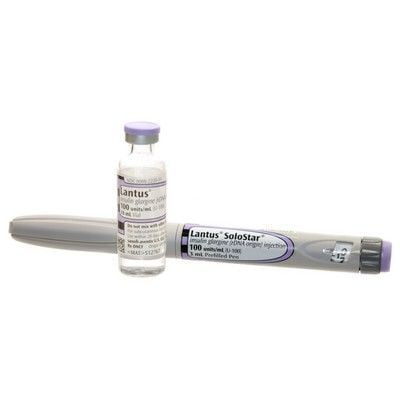Side Effects of Lantus (Insulin Glargine)
Lantus side effects affect patients differently. They may be minor or severe, and some may require medical attention whereas others may not. Using the medication in excess may lead to low blood glucose levels, characterized by the symptoms below:
- Chills
- Cold sweats
- Blurred vision
- Dizziness or drowsiness
- Shaking
- Fast heart beat
- Weakness
- Tingling of the hands or feet
- Hunger
Using an inadequate dosage of Lantus can lead to high blood sugar, resulting in the following symptoms:
- Thirst
- Increased urination
- Confusion
- Drowsiness
- Rapid heart breath
Contact your physician if any of the above symptoms occur; he or she may need to adjust your dose. Allergic reactions to this medication are an example of serious side effects. Allergic reactions to this medication can include the following symptoms:
- Rash
- Severe dizziness
- Difficulty breathing
- Itching or swelling, especially in the face, throat or tongue
Supplements, recreational drugs, vitamins, prescription and over-the-counter drugs can trigger or worsen the side effects of Lantus insulin, that’s why it’s critical to inform your health care practitioner about all the medication you are taking. Always check the labels of all supplements and over-the-counter medications, such as cough medicine and multivitamins, before using them because they may contain sugar or alcohol that can interfere with your blood glucose levels.
Additional negative effects may include:
- Fever
- Sore throat
- Stuffy or runny nose
- Depression of the skin on the injection site
- Itching, redness, swelling and pain at the injection site
Bear in mind that the amount of food you eat may affect your insulin needs; eating less food, skipping meals, or eating more than usual will dictate your insulin needs, so inform your doctor if you change your eating habits so they may adjust your insulin dose safely to avoid the above listed negative effects.
Doctor’s Recommendation
A good insulin regimen should include ultra-fast-acting and long-acting insulin. Lantus is a long acting insulin and its primary function would be to counteract the excessive gluconeogenesis that occurs with the pathophysiology of diabetes and the rapid acting insulin is to take care of hyperglycemia after a meal. Working with an endocrinologist and adopting a ketogenic diet will allow for the most precise police scanner control while minimizing the risk of hypoglycemia.
Disclaimer: Please note that the contents of this community article are strictly for informational purposes and should not be considered as medical advice. This article, and other community articles, are not written or reviewed for medical validity by Canadian Insulin or its staff. All views and opinions expressed by the contributing authors are not endorsed by Canadian Insulin. Always consult a medical professional for medical advice, diagnosis, and treatment.



